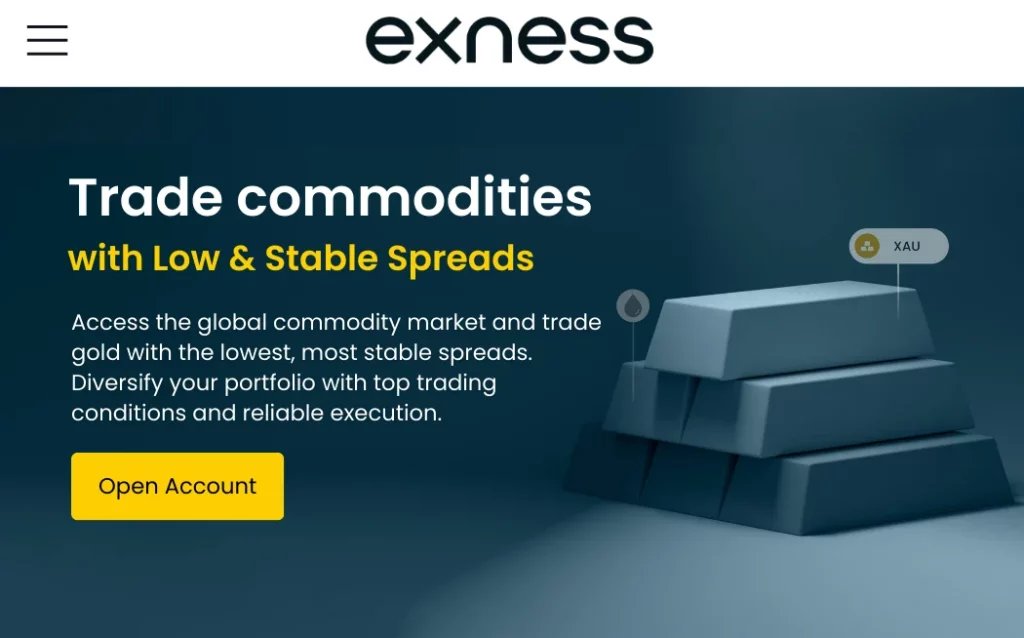
7 minute read
Where to Trade Commodities: Top Broker Platforms
Looking for the right platform to trade oil, gold, or agricultural products? After 15+ years in the markets, I've tested dozens of commodity trading platforms and can tell you this: your choice of broker can make or break your trading strategy. The right platform offers tight spreads, robust tools, and reliable execution when markets get volatile.

Key Factors to Consider When Choosing a Commodity Trading Platform
Before jumping into specific platforms, let's review what actually matters when selecting a commodity broker:
Regulatory compliance - Only trade with brokers regulated by respected authorities like FCA, ASIC, or CySEC
Available commodity markets - Ensure they offer the specific commodities you want to trade (not all brokers offer the same selection)
Spreads and commissions - Lower trading costs mean higher potential profits
Minimum deposit requirements - Should match your starting capital
Leverage options - Higher leverage can amplify profits but also increases risk
Platform stability - Especially crucial during volatile market conditions
Analysis tools - Quality charting, indicators, and market insights
Execution speed - Slippage can kill profitability in fast-moving commodity markets
Customer support - 24/5 support with knowledgeable staff beats generic chatbots
Top Platforms for Trading Commodities
After years of testing different platforms, these consistently deliver the best experience for commodity traders:
MetaTrader 4 (MT4)
MT4 remains the workhorse of commodity trading despite its age. It's not the prettiest platform, but its reliability is unmatched. When oil markets crashed in 2020, many flashier platforms crashed while MT4 kept executing orders.
The customizable interface lets you set up multi-timeframe analysis, and the Expert Advisor functionality makes it ideal for algo traders. Its lightweight design means it runs smoothly even on older computers.
MetaTrader 5 (MT5)
MT5 builds on MT4's foundation with additional timeframes, order types, and a more powerful backtesting engine. The economic calendar integration is particularly useful for commodity traders watching economic data releases.
The platform offers 21 timeframes instead of MT4's 9, which gives more flexibility when analyzing commodity price movements. The netting and hedging account options also provide more flexibility depending on your trading style.
cTrader
cTrader shines with its depth of market (DOM) functionality and advanced order types. For scalpers trading volatile commodities like gold, its level II pricing visibility is a game-changer.
The platform feels more modern than the MetaTrader suite, with a cleaner interface and superior charting. Its low latency execution is noticeable when trading during high-volatility events like crude oil inventory reports.
NinjaTrader
NinjaTrader is the choice of serious futures traders. The platform's advanced order flow analysis tools let you see market depth in ways impossible on most other platforms.
Its market replay feature is invaluable for reviewing how commodities react to specific news events or market conditions. While there's a steeper learning curve, the advanced functionality justifies the time investment for serious traders.
TradingView
TradingView isn't a trading platform itself but partners with many brokers. Its social trading features and superior charting make it popular for technical analysis of commodity markets.
The Pine Script language lets you create custom indicators, and the community features help identify setups you might have missed. I often use TradingView for analysis, then execute trades on a dedicated platform.
Exness for Commodity Trading
Exness has become increasingly popular for commodity trading thanks to competitive spreads on major commodities like gold and oil. Their integration with MT4 and MT5 means you get reliable execution combined with familiar interfaces.
Their scalable leverage options let you adjust risk according to market conditions – crucial when trading volatile commodities. Having tested their execution during major market events, I've found minimal slippage compared to many competitors.
The zero-commission accounts are particularly attractive for high-frequency traders, though the spreads widen slightly to compensate. Their instant withdrawal feature is genuinely useful when you need to access profits quickly.

🏆 Start Trading With Exness – Register Now! 🚀 or Visit the Broker’s Website ⭐
Advantages and Disadvantages of Different Commodity Trading Platforms
Each platform has distinct pros and cons:
MT4
Advantages: Stability, widespread adoption, extensive EA marketplace
Disadvantages: Dated interface, limited timeframes, basic charting tools
MT5
Advantages: More timeframes, improved backtesting, better technical indicators
Disadvantages: Less third-party support than MT4, higher system requirements
cTrader
Advantages: Superior execution, modern interface, excellent depth of market
Disadvantages: Lower availability among brokers, fewer educational resources
NinjaTrader
Advantages: Professional-grade tools, advanced order types, excellent for futures
Disadvantages: Steep learning curve, higher costs, overkill for beginners
TradingView
Advantages: Superior charts, social features, cross-platform functionality
Disadvantages: Not a complete trading solution, subscription costs for advanced features
How to Choose the Best Commodity Trading Platform for You
Rather than following general recommendations, assess your specific needs:
First, identify which commodities you'll actually trade. If you're focused on gold and oil, nearly any platform will suffice. For niche agricultural futures, you'll need specialized platforms like NinjaTrader.
Consider your trading style. Day traders need platforms with minimal latency and advanced order types. Swing traders might prioritize analysis tools and charting capabilities over execution speed.
Your technical comfort matters too. MT4 is straightforward enough for beginners, while NinjaTrader demands more technical knowledge.
Don't underestimate the importance of practice. Most platforms offer demo accounts – use them extensively before committing real capital. What looks good on paper might feel awkward in practice.
Finally, consider your long-term goals. If you plan to eventually automate strategies, platforms with solid API access and programming capabilities should be prioritized from the start.

🏆 Start Trading With Exness – Register Now! 🚀 or Visit the Broker’s Website ⭐
Conclusion
The best commodity trading platform balances cost, functionality, and reliability for your specific trading approach. While I've highlighted the strengths of each major platform, there's no substitute for hands-on testing.
For most commodity traders, the MetaTrader suite offers the best combination of accessibility and capability. More advanced traders might benefit from cTrader or NinjaTrader's enhanced features. Exness provides a solid broker option with competitive conditions for commodity traders at various experience levels.
Whatever platform you choose, remember that execution quality and reliability during volatile markets should never be compromised. A platform with slightly higher costs but better execution will save you money in the long run.
Frequently Asked Questions (FAQs)
Which platform is the best for trading commodities?
There's no one-size-fits-all answer. MetaTrader 5 offers the best all-around solution for most commodity traders, combining robust features with widespread availability. Professional futures traders often prefer NinjaTrader, while those prioritizing execution quality might choose cTrader. Your trading style, capital, and specific commodity interests should guide your choice.
Can I trade commodities with no commissions?
Yes, many brokers offer zero-commission accounts for commodity trading, including Exness. However, these accounts typically have slightly wider spreads to compensate. For larger position sizes, commission-based accounts with tighter spreads often work out cheaper overall. Calculate the total trading costs based on your typical position size and trading frequency.
Are there mobile apps for commodity trading?
All major platforms now offer mobile versions. MT4 and MT5 have fully-functional mobile apps that allow complete trading capabilities. TradingView's mobile app excels for analysis but requires broker integration for trading. Mobile trading is convenient but has limitations – complex order types and detailed analysis are still better performed on desktop versions.
Is Exness a good platform for trading commodities?
Exness provides solid commodity trading conditions with competitive spreads on major commodities like gold and crude oil. Their MT4/MT5 integration offers reliable execution, and the scalable leverage options suit different risk appetites. Their instant withdrawal feature is particularly valuable for active traders. For most retail commodity traders, they offer a balanced mix of cost, functionality, and service.
What commodities can I trade on Exness?
Exness offers trading on major commodities including gold, silver, oil, natural gas, and copper. Their precious metals offering is particularly strong, with competitive spreads on XAU/USD (gold) and XAG/USD (silver). They also offer oil trading through both Brent and WTI crude contracts. The selection covers the most actively traded commodities but doesn't extend to agricultural futures or more exotic commodities available on specialized futures exchanges.










